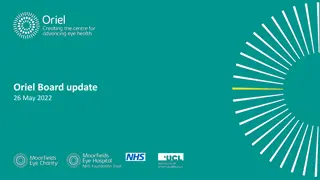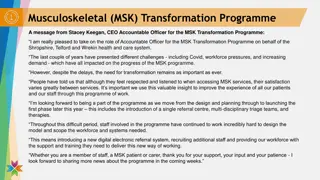Board Excellence Programme
Overview of stress testing and its importance in evaluating the resilience of a business plan. It covers the three-step process of identifying headroom, mapping out and quantifying risks, and identifying mitigating actions.
Download Presentation

Please find below an Image/Link to download the presentation.
The content on the website is provided AS IS for your information and personal use only. It may not be sold, licensed, or shared on other websites without obtaining consent from the author.If you encounter any issues during the download, it is possible that the publisher has removed the file from their server.
You are allowed to download the files provided on this website for personal or commercial use, subject to the condition that they are used lawfully. All files are the property of their respective owners.
The content on the website is provided AS IS for your information and personal use only. It may not be sold, licensed, or shared on other websites without obtaining consent from the author.
E N D
Presentation Transcript
Board Excellence Programme 16 February 2023 Introduction to stress testing Mick Warner
Overview Tests the resilience of a business plan to breaking point Needs to be owned by the Board As we have seen, it is a regulatory requirement The scenarios may or may not turn out to be correct they are a means to get to the breaking point Mitigating actions are key
A definition Stress tests are used to evaluate whether existing financial (e.g. capital & liquidity) and operational (e.g. staff and IT systems) resources are sufficient to withstand an economic downturn or unexpected event
A three-step process 1. Identify the headroom in the business plan 2. Map out and quantify the risks 3. Identify mitigating actions
Identify the headroom in the business plan Cash Loan covenants Key financial ratios/golden rules Security
Map out and quantify the risks Strategic risks Operational risks existing stock and service delivery Operational risks development Finance and treasury management
Strategic risks Macroeconomic and financial environment Delivering against expectations Diversification Access to labour and skills Counterparty risks
Operational risks existing stock and service delivery 1 Existing stock quality Delivering services to tenants Health and safety Costs and inflation Rent setting
Operational risks existing stock and service delivery 2 Rental income and arrears Data security Data integrity Supported housing
Operational risks development Low-cost home ownership and market sales Construction process risks
Finance and treasury management Existing debt New debt Alternative funding models Pensions Fraud
Identify mitigating actions Quantify the scale of recovery required Identify potential actions and quantify them Consider how soon mitigating actions can be implemented Quantify any additional costs as a result Assess the impact on services and customers Assess the impact on the organisation s reputation
Thoughts? Questions? Comments?
































